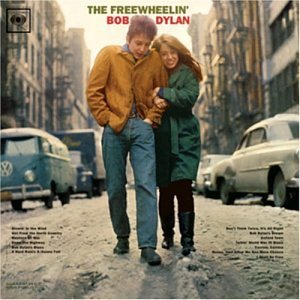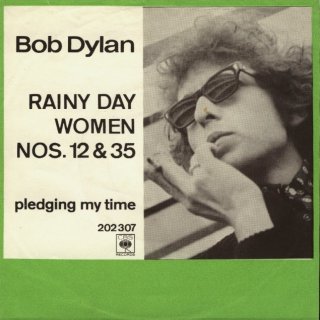Related Research Articles

Blonde on Blonde is the seventh studio album by the American singer-songwriter Bob Dylan, released as a double album on June 20, 1966, by Columbia Records. Recording sessions began in New York in October 1965 with numerous backing musicians, including members of Dylan's live backing band, the Hawks. Though sessions continued until January 1966, they yielded only one track that made it onto the final album—"One of Us Must Know ". At producer Bob Johnston's suggestion, Dylan, keyboardist Al Kooper, and guitarist Robbie Robertson moved to the CBS studios in Nashville, Tennessee. These sessions, augmented by some of Nashville's top session musicians, were more fruitful, and in February and March all the remaining songs for the album were recorded.

The Freewheelin' Bob Dylan is the second studio album by the American singer-songwriter Bob Dylan, released on May 27, 1963, by Columbia Records. Whereas his self-titled debut album Bob Dylan had contained only two original songs, this album represented the beginning of Dylan's writing contemporary lyrics to traditional melodies. Eleven of the thirteen songs on the album are Dylan's original compositions. It opens with "Blowin' in the Wind", which became an anthem of the 1960s, and an international hit for folk trio Peter, Paul and Mary soon after the release of the album. The album featured several other songs which came to be regarded as among Dylan's best compositions and classics of the 1960s folk scene: "Girl from the North Country", "Masters of War", "A Hard Rain's a-Gonna Fall" and "Don't Think Twice, It's All Right".

The Times They Are a-Changin' is the third studio album by the American singer-songwriter Bob Dylan. It was released on February 10, 1964, through Columbia Records. Whereas his previous albums, Bob Dylan (1962) and The Freewheelin' Bob Dylan (1963), combined original material and cover songs, this was the first to feature only original compositions. The album consists mostly of stark, sparsely arranged ballads concerning issues such as racism, poverty, and social change. The title track is one of Dylan's most famous; many feel that it captures the spirit of social and political upheaval that characterized the 1960s.
"Masters of War" is a song by Bob Dylan, written over the winter of 1962–63 and released on the album The Freewheelin' Bob Dylan in the spring of 1963. The song's melody was adapted from the traditional "Nottamun Town." Dylan's lyrics are a protest against the Cold War nuclear arms build-up of the early 1960s.

Bob Dylan is an American singer-songwriter. Considered one of the greatest songwriters of all time, Dylan has been a major figure in popular culture over his 60-year career. With an estimated figure of more than 125 million records sold worldwide, he is one of the best-selling musicians of all-time. Dylan added increasingly sophisticated lyrical techniques to the folk music of the early 1960s, infusing it "with the intellectualism of classic literature and poetry". His lyrics incorporated political, social and philosophical influences, defying pop music conventions and appealing to the burgeoning counterculture.
"Bob Dylan's Dream" is a song written by Bob Dylan in 1963. It was recorded by Dylan on April 24, 1963, and was released by Columbia Records a month later on the album The Freewheelin' Bob Dylan.
"Bob Dylan's Blues" is a song written and performed by the American singer-songwriter Bob Dylan, that was first released as the fifth track on his 1963 album, The Freewheelin' Bob Dylan.
"Talkin' New York" is the second song on Bob Dylan's eponymous first album, released in 1962. A talking blues, the song describes his feelings on arriving in New York City from Minnesota, his time playing coffee houses in Greenwich Village, and his life as a folksinger without a record deal. The lyrics express the apparent difficulty he had finding gigs as a result of his unique sound, with a character in the song telling Dylan: "You sound like a hillbilly; We want folk singers here."

"Pledging My Time" is a blues song by the American singer-songwriter Bob Dylan from his seventh studio album, Blonde on Blonde (1966). The song, written by Dylan and produced by Bob Johnston, was recorded on March 8, 1966 in Nashville, Tennessee. Dylan is featured on lead vocals, harmonica, and guitar, backed by guitarist Robbie Robertson and an ensemble of veteran Nashville session men.
"Let Me Die in My Footsteps" is a song written by American singer-songwriter Bob Dylan in February 1962. The song was selected for the original sequence of Dylan's 1963 album The Freewheelin' Bob Dylan, but was replaced by "A Hard Rain's a-Gonna Fall". This version was recorded at Columbia studios on April 25, 1962, during the first Freewheelin' session, and was subsequently released in March 1991 on The Bootleg Series Volumes 1–3 1961–1991.

The Bob Dylan World Tour 1966 was a concert tour undertaken by the American musician Bob Dylan, from February to May 1966. Dylan's 1966 World Tour was notable as the first tour where Dylan employed an electric band backing him, following him "going electric" at the 1965 Newport Folk Festival. The musicians Dylan employed as his backing band were known as the Hawks, who later became famous as the Band.
"Oxford Town" is a song written by American singer-songwriter Bob Dylan in 1962. It was recorded in Columbia's Studio A on December 6, 1962, for his second album, The Freewheelin' Bob Dylan.
"Talkin' John Birch Paranoid Blues", also known as "Talkin' John Birch Society Blues" and "Talkin' John Birch Blues", is a protest song and talking blues song written by singer-songwriter Bob Dylan in 1962. It is a satirical song, in which a paranoid narrator is convinced that communists, or "Reds" as he calls them, are infiltrating the country. He joins the John Birch Society, an anti-communist group, and begins searching for Reds everywhere. The narrator decries Betsy Ross as a communist and four U.S. Presidents as Russian spies, while lauding Adolf Hitler and George Lincoln Rockwell. After exhausting the possibilities of new places to find communists, he begins to investigate himself.

The Bootleg Series Vol. 9: The Witmark Demos: 1962–1964 is a compilation album by American singer-songwriter Bob Dylan, containing demo recordings he made for his first two publishing companies, Leeds Music and M. Witmark & Sons, from 1962 to 1964. The seventh installment of the ongoing Bob Dylan Bootleg Series, it was released on October 19, 2010 on Legacy Records.
"Farewell", also known as "Fare Thee Well", is a song by American singer-songwriter Bob Dylan. Dylan wrote the song in January 1963. He considered it for his third album, The Times They Are a-Changin', but only attempted a few takes during the album's first studio session. Dylan's earlier recordings of "Farewell" found their way onto various bootlegs, and a collection of demos that included the song was released in October 2010 as The Bootleg Series Vol. 9 – The Witmark Demos: 1962–1964.
"Mama, You Been on My Mind" is a song by American singer-songwriter Bob Dylan. Written in 1964 during a trip to Europe, the song dealt with his recent breakup with his girlfriend, Suze Rotolo. Dylan first recorded the song in June of that year during a session for his album Another Side of Bob Dylan. However, the song was not included on the album, and Dylan's version remained unreleased until 1991. In total, in the 1990s and 2000s four versions were put out on Dylan's Bootleg Series of releases, including two live performances with Joan Baez from 1964 and 1975.
Bob Dylan is an American musician, singer-songwriter, music producer, artist, and writer. He has been an influential figure in popular music and culture for more than five decades. Much of his most celebrated work dates from the 1960s when he was an informal chronicler and a seemingly reluctant figurehead of social unrest.
"Talkin' Bear Mountain Picnic Massacre Blues" is a song by American singer-songwriter Bob Dylan. It was written by Dylan in June 1961, and recorded on April 25, 1962, at Studio A, Columbia Recording Studios, New York, produced by John Hammond. It is a humorous talking blues, which Dylan wrote after Noel Stookey gave him a press clipping about how the sale of forged tickets for a Father's Day picnic trip to Bear Mountain State Park had led to overcrowding and injuries.
"Down the Highway" is a song by American singer-songwriter Bob Dylan. It was recorded on July 9, 1962 at Studio A, Columbia Recording Studios, New York, produced by John Hammond. The song was released on The Freewheelin' Bob Dylan on May 27, 1963. It is a twelve-bar blues love song, which Dylan told his girlfriend Suze Rotolo he had written about her.
"I Shall Be Free No. 10" is a song by American singer-songwriter Bob Dylan, which was released as the fifth track on his fourth studio album Another Side of Bob Dylan (1964). The song was written by Dylan and produced by Tom Wilson. The song is a humorous talking blues, indebted to earlier songs including Lead Belly's "We Shall Be Free". Dylan opens the song by proclaiming that he is normal and average, but then acknowledges his reputation by singing the self-aware doggerel "Yippee! I'm a poet, and I know it/ Hope I don't blow it".
References
- 1 2 3 4 Heylin, Clinton (1995). Revolution in the Air – the songs of Bob Dylan Vol.1 1957–73. Constable & Robinson. pp. 132–136. ISBN 9781849012966.
- 1 2 Gray, Michael (2008). The Bob Dylan Encyclopedia. London: Continuum International Publishing Group. p. 340. ISBN 9780826429742.
- 1 2 3 4 5 Margotin, Philippe; Guesdon, Jean-Michel (2015). Bob Dylan All the Songs: The Story Behind Every Track. Black Dog and Leventhal Publishers. p. 73. ISBN 978-1579129859.
- ↑ "Still on the road: 1962 concerts and recording sessions". bjorner.com. Olof Björner. Archived from the original on November 20, 2010. Retrieved May 14, 2021.
- ↑ "Still on the road: 1963 concerts and recording sessions". bjorner.com. Olof Björner . Retrieved May 23, 2021.
- 1 2 3 4 5 "I Shall Be Free". bobdylan.com. Retrieved May 24, 2021.
- 1 2 3 Trager, Oliver (2004). Keys to the rain: the definitive Bob Dylan encyclopedia. New York: Billboard Books. pp. 308–309. ISBN 0823079740.
- ↑ Williams, Paul (2004). Bob Dylan: performing artist. 1960–1973 the early years. Omnibus Press. pp. 62–63. ISBN 1844490955.
- ↑ Harvey, Todd (2001). The Formative Dylan: Transmission & Stylistic Influences, 1961–1963. The Scarecrow Press. p. 52. ISBN 0-8108-4115-0.
- ↑ Shelton, Robert (2003). No Direction Home. Da Capo Press. p. 157. ISBN 0306812878.